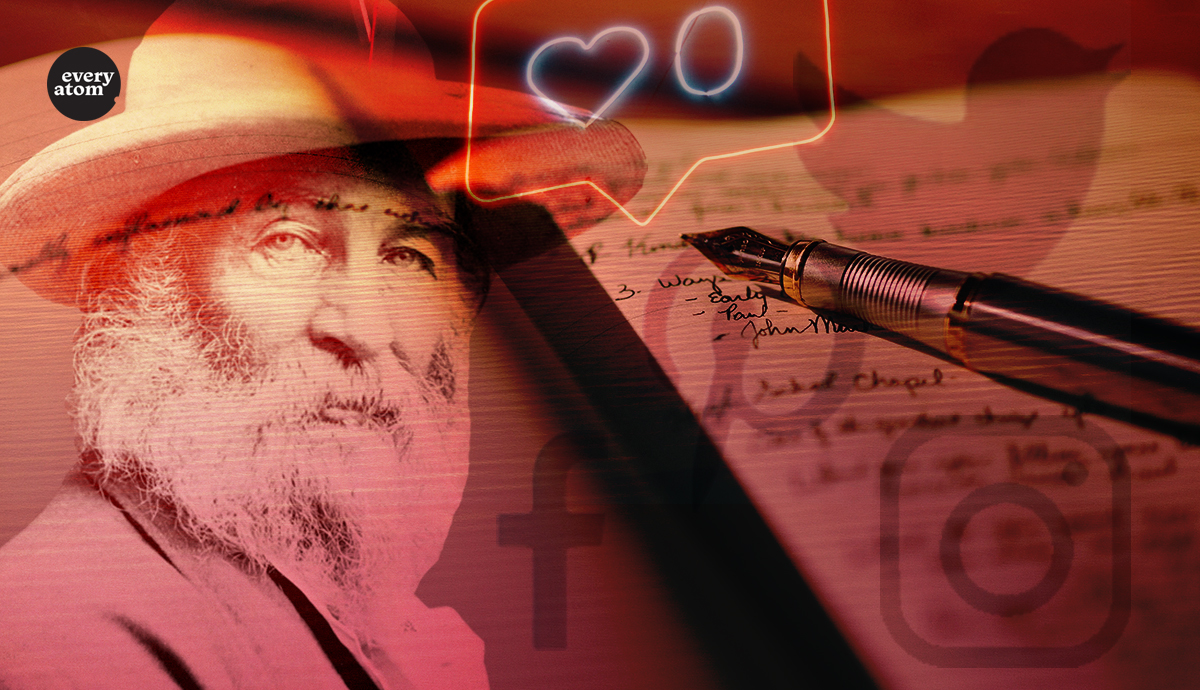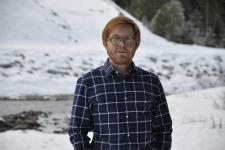Every Atom | No. 175
Introduction to Every Atom by project curator Brian Clements
In idea, Walt Whitman’s “Song of Myself” is wholly unoriginal. Perhaps in poetry it was new to speak of one’s self, to examine connections between the self and others, but this idea—the I—had been central to nonfiction for well over a millennium: Whitman’s contemporary, Henry David Thoreau, brought readers deeply into his experiment at the edge of Walden Pond; farther back, Michel de Montaigne asked himself in his towered study in France, What do I know? (It turns out he knew a lot about himself.); even farther—Saint Augustine confessed about his desire for chastity—but just not yet; the letters of Saint Paul can even be read as an examination of the I, of the self.
But Whitman, in execution and exploration, is wholly original in the history of literature. Is there any more American phrase than I sing of myself, much less the radical notion of celebrating one’s self? It is through this rhapsodic, endless exploration of travel through the self, then reaching out to others, reaching out to not only the human world but the entire universe, that by reading Whitman we come to better know ourselves.
Perhaps what makes Whitman so enticing, so relevant still, is that his I is so companionable. We feel like we know him: we get his musings and passions, his obsessions and wonderment. We feel like he is the neighbor we love to chat with over the hedge, staring wide-eyed at his observations about himself and the wider world.
In our modern times we live in a world of I’s—reality television, Twitter, Facebook, the endless invitation to think about ourselves. The difference I see between our execution of ourselves (our I’s) and Whitman’s is that Whitman’s mission is more generous—his I is reaching out towards us, rather than simply stagnating with only himself. It is an act of generosity, of invitation, of probing the recesses of the mind and body in an attempt for develop a relationship—why else would we continue reading him so long after the worms have had their feast on his dead body?
When I think of Whitman, I think of his boldness, of beginning so confidently and curiously with one of the smallest words in the English language: I. It’s radical, it’s confusing, it’s an invitation to scratch our heads and wonder, Where the hell is Walt going this time?
I can still remember breezing by this small word in Ms. Montgomery’s eleventh grade English class, and I can now see, after returning to “Song of Myself” dozens of times in the intervening years, how much I missed by cruising on by that beginning word. Because I was obsessed with myself, all seventeen years of myself, I missed—but, thankfully, later found—why I so loved getting to spend time with Walt Whitman.
As we’re reminded so often in literature, the end depends upon the beginning, and Walt Whitman’s beginning with the I, steering our course through the channels, rapids, and lazy oxbows of his mind, brings us to a new realization: a deep encounter with ourselves.
Recommended
Nor’easter
Post-Op Appointment With My Father
Cedar Valley Youth Poet Laureate | Fall 2024 Workshop







